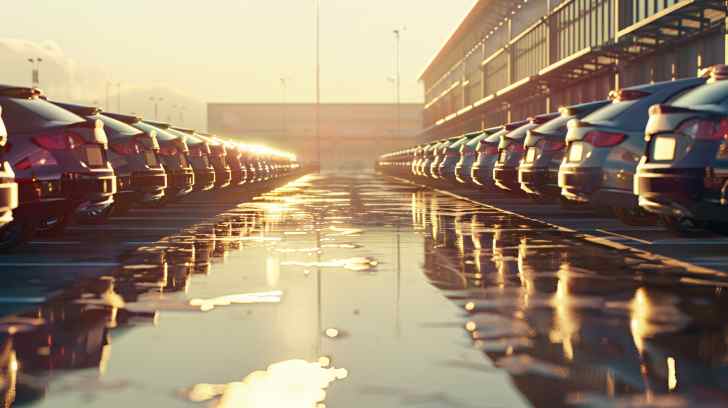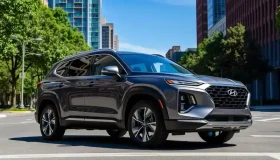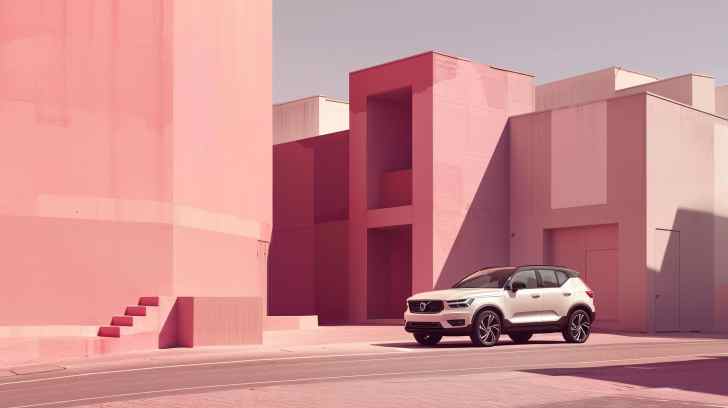In today’s commerce-driven world, the auto industry plays a crucial role. Yet, an unusual problem persists. There are too many unsold vehicles on dealers’ lots across the country. These cars lose value every minute they sit unsold. For dealerships, finding efficient ways to manage this surplus is critical. This is where vacant land comes in. What seems like an inactive asset can become a lively and profitable real estate project. This is particularly true for those focusing on car storage. Storing unsold cars on empty land is becoming a key player in the real estate growth industry.
Jeff Jackson, a seasoned manager at Gee Automotive, shares his struggle: dealerships need to display new models until they’re sold. This can mean reducing prices or offering special deals. Often, this is because the cars have features that are not in high demand or simply the wrong color. Turning vacant land into secure areas for storing cars appears to be a winning strategy. Recently, a global microchip shortage has impacted major brands like Jeep, Honda, and Toyota, causing reduced production. This situation has increased demand, transforming empty lots into prime land investment opportunities.
Current trends in the used-car market are leading to changes. Owners are selling extra cars and dealerships are presenting attractive offers. Yet, it is clear: landowners have a great chance to make money from these situations.
Key Takeaways
- Unsold vehicles provide a unique opportunity for vacant land utilization.
- Landowners can create a new real estate growth industry centered around car storage.
- Price reductions and incentives in the auto industry increase the need for storage solutions.
- The microchip shortage has spiked demand, making land investment for vehicle storage more attractive.
- Providing storage can be a profitable real estate venture in current market conditions.
Exploring Car Storage as a Real Estate Growth Industry
The US has seen a rise in unsold new cars at dealerships. This shows a unique chance in the car industry and real estate. With car making facing problems, many vehicles end up in crowded lots. This situation boosts interest in using empty land for storing cars. This brings a good match between unused real estate and unsold cars.
Addressing the Abundance of Unsold New Cars
Car dealers try to sell these new cars by offering discounts, but many stay unsold. These cars often lack popular features or come in less favored colors. They remain in lots, not bought even at lower prices. This issue gets worse when car rebates are highest, which should be the best buying time. Yet, the excess cars remain.
How Car Dealerships Manage Overstock and Inventory
Car dealerships feel the pressure to handle their growing stock. Their strategy includes putting as many cars as possible into their space. This approach is not efficient and hurts the customer’s experience. To solve this, the SubTropolis in Kansas City offers a good example. It’s a large underground space for car storage, helping both the car industry and real estate developers.
Benefits of Converting Vacant Land into Vehicle Storage Facilities
Turning empty land into car storage spaces has many advantages. It eases the crowdedness at car lots and makes unusable land profitable. By moving extra unsold cars to big, well-organized storage areas, landowners can make a steady income. This helps grow both the real estate and car sectors.
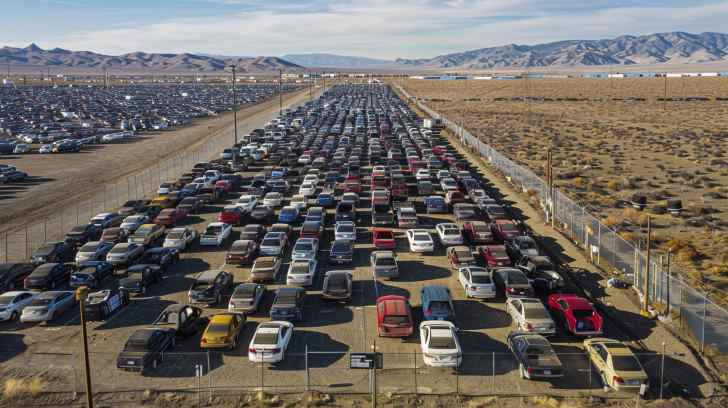
Below is a table showing the income from turning empty land into car storage versus typical real estate projects.
| Development Type | Average Initial Investment | Estimated Annual Revenue |
|---|---|---|
| Traditional Real Estate Development | $500,000 | $50,000 |
| Car Storage Facility | $300,000 | $75,000 |
Landowner Strategies for Capitalizing on Unsold Cars
Landowners with empty land have a great chance to make money in today’s market. They can do this by setting up places to store unsold cars. This idea is good for making money without doing much. It turns the land into a key resource as the car market changes.
Using empty land for car storage is a smart move. It helps with the overflow of cars that dealerships can’t keep. This happens because they run out of space or because they’re not selling as many cars. Landowners can offer storage for these cars and make good money. They don’t have to manage the land every day.
Setting up a vehicle storage facility is easy and makes money regularly. Even though the IRS usually thinks of real estate income as active, this is not the case here. The landowner doesn’t have to manage the storage daily, so it’s considered passive income.
By using their land wisely, landowners can solve the auto industry’s storage problem. They also improve their financial situation in the investment world.
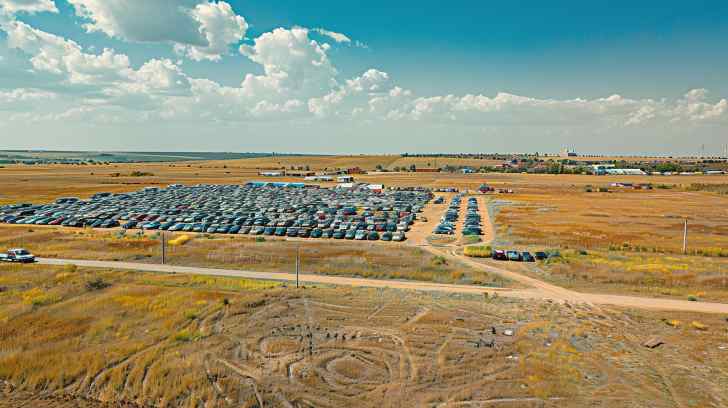
- Offer safe and accessible locations for old unsold cars.
- Ensure efficient management to keep the cars in good condition.
- Use smart marketing to find dealerships that need storage places.
| Storage Facility Features | Benefits to Landowners | Benefits to Dealerships |
|---|---|---|
| High-security fencing and surveillance | Increases property value and makes it more attractive for leasing | Keeps cars safe and ready for sale |
| Easy accessibility and good infrastructure | Draws in good dealerships and promises long-term agreements | Makes moving and handling cars easier |
| Flexible space options | Uses land well and caters to different amounts of cars | Adjusts storage space as needed, based on market changes |
This new way of using land for car storage is not just secure. It also fits perfectly with aims to make dealership lots less crowded. Plus, it helps the environment and the economy too.
Conclusion
The auto industry is always changing, with more unsold cars piling up. Innovative car dealers are now looking for smart solutions. Vacant land is emerging as a key resource, offering a way to handle excess stock better. Using unused real estate as storage space benefits both the real estate and automotive industries by creating new income opportunities.
The way car dealerships operate is changing, from how they manage financing to how they negotiate deals. Having extra land for storing unsold vehicles gives them breathing room, freeing up space on their own lots. This smart use of resources helps keep new car sales going without losing precious onsite space.
It’s important to guide consumers in car buying, just as it’s crucial for dealerships to find ways to cut down excess inventory. Landowners earn passive income by partnering with dealers in need of storage space. Dealers, in turn, gain room to display their best vehicles and store others temporarily. As the industry evolves, those who adapt quickly will find the most success. Vacant land storage is a strategic move in today’s market.
FAQ
How can vacant land be a profitable investment for storing unsold cars?
Vacant land offers a smart way to make money by meeting the auto industry’s need for car storage. Owners can turn their land into storage spaces for a steady income. This setup helps both the real estate and auto industries.
What challenges do car dealerships face with unsold new cars?
Dealerships struggle to sell new cars that people don’t want, either due to features or color. They cut prices and offer special deals to attract buyers. Handling too many cars also leads to storage and inventory issues.
Why is it considered beneficial to convert vacant land into vehicle storage facilities?
Turning empty land into car storage is smart as it fills a big need for space in the auto world. It lets landowners make money from land that isn’t being used. Plus, it keeps cars safe and dealerships organized.
What factors contribute to the abundance of unsold new cars at dealerships?
A lot of unsold cars are due to making more than needed, or cars that don’t match what buyers want. Tough economic times and parts shortages like microchips add to the problem. Cars that lack popular features or colors get left behind too.
How do car dealerships manage overstock and excess inventory?
To deal with too many cars, dealerships lower prices, offer special deals, and use rebates. Sometimes, they even sell cars at auctions if they don’t get sold. This helps keep their stock just right and prevents money loss from unsold cars.
Can landowners gain passive income from leasing their land for car storage?
Yes, leasing land for car storage is a passive way to make money. It’s pretty good if the location is near dealerships or where lots of cars are stocked.
What are the best times to buy a car with the potential for significant discounts?
Great times for car deals are at the end of the month, quarter, or model year. Dealers work hard to meet sales goals. Holidays and new model releases also see big discounts to clear out old stock.
What should a car buying guide include when considering unsold or discounted vehicles?
A good guide covers how to check prices, know the best times for discounts, and negotiate. It should help buyers look into deals, rebates, and hidden costs with unsold or discounted cars.
How often do car dealerships turn to auctions to sell old unsold cars?
Dealers often use auctions for cars not sold within about 60 days. Selling these cars gets harder with time. Auctions help get some money back and make room for new cars.


